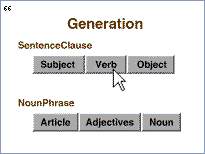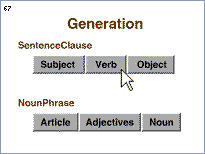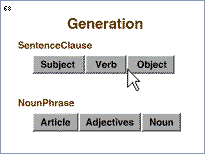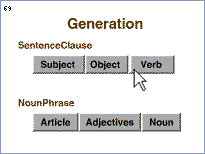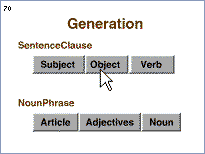Download MP3 audio;
also software, and then large-font
English grammar and Awa grammar for live demo
portion.
Please note that some of the numbers in this presentation
may vary from time to time, depending on who you ask and what criteria
they use in deciding which languages count as "Bibleless". Continuing surveys
often revise figures up or down as new dialects are discovered, or smaller
groups become assimilated into their national culture and stop teaching
their tribal language to children. For current numbers, see the Ethnologue.
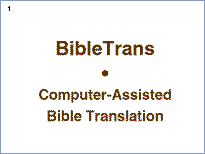 |
Rev. 2010 July 12
Pastor invited me to tell you something about Bible translation
and what I am doing in it.
This is a church service, so we will begin with Scripture.
It should be a familiar passage to you, so you don't need to look it
up in your Bibles.
We can read it here right off the screen... |
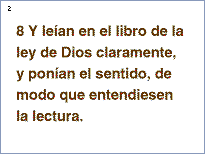 |
[read it]
Now I recognize that not very many of you understood what I just read,
so let me translate it for you:
"And they read in the book of the law of God of course, and put the
chair, from a way that entered the lecture."
Pastor, you know Spanish, Yes or no, did I translate it OK?
No, it was a horrible translation. It completely lost the meaning of
the verse.
Do you understand what happened here?
You can't read the Scripture up here, and I botched the translation
into your language.
300 million people in the world, that's all the Bible they have:
some other language that a few people in their church (if they have
a church) know,
and even fewer can tell them accurately what it says. |
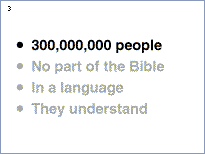 |
That's 300 million people... |
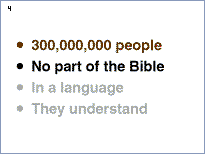 |
...with no part of the Bible... |
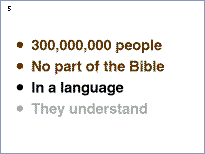 |
...in any language... |
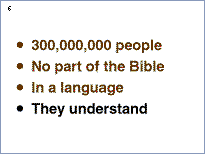 |
...that they understand. |
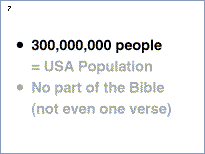 |
300 milion people... |
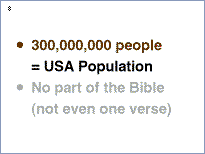 |
That's approximately equal to population of the United States.
For every man, woman, and child in the USA,
there is another person somewhere else in the world -- mostly southeast
Asia, Africa, and South America --
|
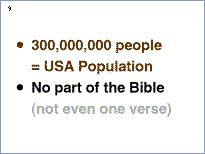 |
...with no part of the Bible in a language they can understand... |
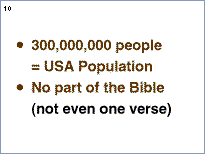 |
not even one verse.
Faith comes by hearing and hearing by the Word of God.
How can they come to faith if they cannot hear or read the Bible and
understand it?
It gets worse. 300 million people in the United States almost all speak
one language, English... |
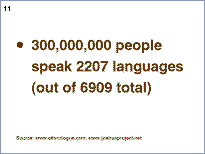 |
The 300 million people with no Bible in their language speak
over 2000 languages.
There are nearly 7000 distinct languages in the world today,
languages where a person who knows only one of them
cannot understand what a person speaking another one of them is saying. |
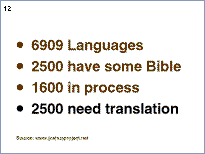 |
Less than 500 of those languages have a complete Bible.
Perhaps 2000 have at least the full New Testament.
There is Bible translation going on in about 2000 more.
The remaining 3000 or so languages have no Scriptures at all,
but some of those languages are dying out, with less than 100 native
speakers.
Others are in a culture where just about everybody reads and understands
a trade language. The Native American languages in the States today are
like that. Everybody knows English, some of them also know a variant of
their ancestral language.
That leaves a little more than 2000 languages, an average of more than
100,000 people speaking each language -- the size of Springfield, 2000
times -- who have no way to hear the Word of God in their own language,
not even John 3:16.
How many churches in America of 1000 members support two or more full-time
pastors? They have nobody, no Bible, nothing. |
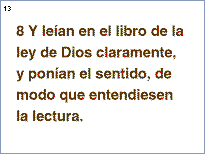 |
[Pause]
This verse is important enough, I want you to really understand it. |
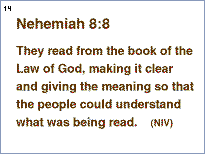 |
[read it]
Ezra the Scribe and his associates stood up on a pulpit of wood and
read from the Bible -- and TRANSLATED it, so the people could understand
what it says.
Let's think about the context... |
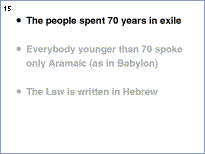 |
The Jews had spent 70 years in Babylonian exile, as prophesied
by the prophet Jeremiah.
How many of you remember what it was like 70 years ago?
I wasn't even born 70 years ago! |
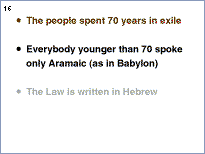 |
Most of the people listening to Ezra read the Bible, were
born and raised in Babylon.
Do you know what language they spoke? Aramaic was the language of Babylon.
Pastor was raised in Chile, so he speaks very good Spanish --
sometimes better than his English. It's the language he grew up in. |
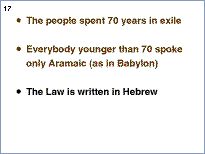 |
The Bible they were reading was in Hebrew.
Hebrew is a different language.
Ancient Hebrew was never again spoken by people in their homes after
the Babylonian exile.
Everybody spoke Aramaic. |
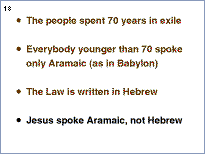 |
Even Jesus spoke Aramaic. He could read Hebrew, but he spoke
Aramaic.
To understand the difference between Hebrew and Aramaic,
we start in the Bible, |
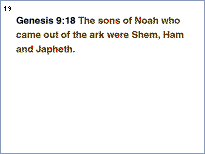 |
Genesis chapter 9 lists the sons of Noah, right after the
Flood.
[read it] |
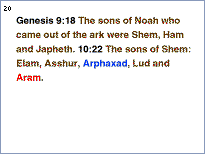 |
In the next chapter, we are told that Shem had five sons,
Elam, Asshur, Arphaxad, Lud, and Aram.
Arphaxad and Aram were brothers.
Put your mental finger on Aram,
while we follow Arphaxad... |
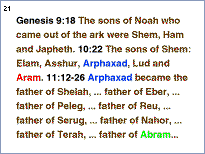 |
...in the next chapter,
Arphaxad lived 35 years, then became the father of Shelah. And after
that he lived 403 years and had other sons and daughters.
Shelah lived 30 years, then became the father of Eber. Eber became the
father of Peleg. Peleg the father of Reu, the father of Serug, the father
of Nahor, the father of Terah.
Terah became the father of Abram, Nahor and Haran.
You all know who Abram was.
|
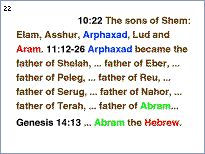 |
Abram was the first Hebrew.
There, we have two languages, Aram, who spoke the language that bears
his name, Aramaic,
and the language Hebrew came from Abram the Hebrew.
We have nine generations there, 290 years. Aram and Arphaxad grew up
together and could understand each other, but Abram left home.
From Abraham to the return from Babylonian exile was about 1500 years.
A thousand years does something to the language. |
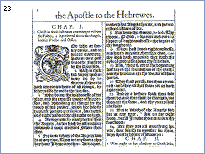 |
You are all familiar with this language, it's a page from
the Bible in English.
Some of you try to read it every day.
This page was printed in 1611. After 400 years it's pretty hard to understand.
We can go back farther than that. |
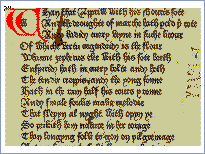 |
This is the first page from the first edition of Chaucer's
Canterbury Tales.
It was written more than 600 years ago, hand-copied before printing
was invented.
Can you read it? It's pretty hard.
I'm sure my pronunciation is wrong, but let me try...
|
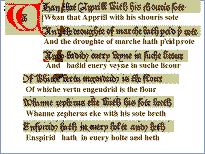 |
Whan that Apprill with his shouris sote
And the droughte of marche hath percid pe rote
And badid euery veyne in suche licour
Of whiche vertu engendrid is the flour...
Did you understand it? Maybe with modern spelling... |
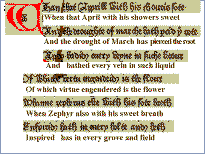 |
I don't know about you, but it still doesn't make much sense
to me.
This is 600-year-old English, completely unintelligible to us. |
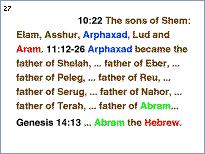 |
Now look at the difference between Aramaic and Hebrew.
290 years from Aram and Arphaxad to Abram, and
some 1500 years from Abraham to Nehemiah,
almost 2000 years of language change.
That's three times as long as from Chaucer to us. |
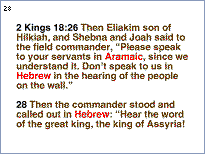 |
The Bible mentions the difference between Aramaic and Hebrew
also in 2nd Kings,
a couple hundred years before Nehemiah, when Sennacherib was attacking
Jerusalem.
He sent his messengers to urge them to surrender.
The Assyrians spoke Aramaic, but the Jewish people watching from the
top of the wall understood only Hebrew. Hezekiah's officers request that
the Assyrian officials speak Aramaic, so that the people watching from
the top of the wall would not understand the threat to their safety.
But the Assyrians wanted them to understand. The Assyrians wanted them
to be afraid.
We have an interesting language incident in the New Testament, too. |
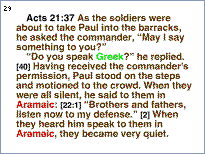 |
Paul was arrested in Jerusalem and taken to the Roman fortress.
He speaks to the colonel in Greek.
This is after the exile, the people only speak and understand Aramaic,
which you can see here.
Greek was the language of educated people, like Paul and the Roman
officers.
In Germany today everybody speaks German, but the educated people also
speak English.
In Mexico, everybody speaks Spanish, but the educated people also speak
English.
English today is like Greek was in the first century. We live in Athens,
so we don't notice it.
God cares about language, and the New Testament was originally written
in Greek
so the most people could understand it,
especially the educated people responsible for copying and preserving
it.
We have it in English today because 500 years ago God's people translated
it for us.
And again more recently because our language changed. |
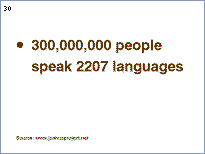 |
But what about those other 300 million people? The ones
with no Bible in their language. What are we going to do for them? |
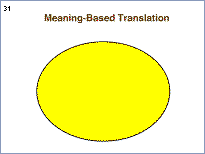 |
Let's look at what it means to translate the Bible into
a new language.
We can think of this yellow oval as representing the universe of ideas,
everything that you can think or say in any language, it's somewhere
here in the oval. |
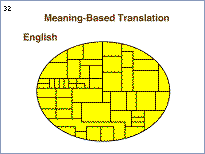 |
Each language divides up the universe of ideas into words
and grammar for saying those ideas.
Some words are very general and cover a lot of idea space;
others are very precise and cover only a small space.
Of course there are also many overlaps that don't show up well in this
simplification.
Some words -- like that funny snake-like space near the bottom... |
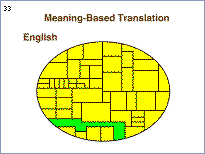 |
...can have very different meanings, depending on how it's
used in context.
"Hot" in English can refer to temperature,
or the amount of pepper in the food,
or whether a woman is sexy,
or whether a gambler is particularly lucky. |
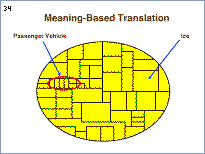 |
Now if this represented English, we might have a lot of
different words that express different kinds of passenger vehicles,
words like "car" and "van" and "bus" and maybe even "pickup" and "motorcycle".
On the other hand, we don't have a lot of words for "ice".
If we want to describe a particular kind of ice, we use adjectives and
descriptive phrases. |
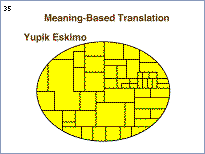 |
A different language -- perhaps Zulu or Hindi or Siberian
Yupik Eskimo --
cuts up the universe into words very differently. |
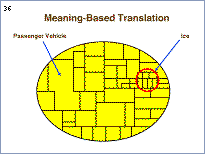 |
Ice is very important to the Yupik Eskimo,
so they have a large number of very precise words to describe different
kinds of ice. |
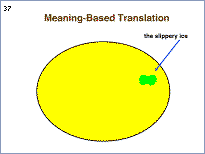 |
Now suppose I want to talk about the slippery ice.
I might have in mind some general blob of meaning like the green splotch
here, not overly precise. |
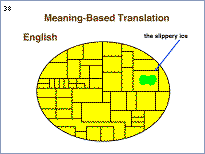 |
Because I speak and think in English, it turns out my idea
fits nicely into the English word "ice".
But if I want to translate that word into Yupik... |
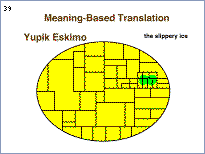 |
...which word do I use?
Language is like that, there is no exact correspondence of ideas to
words between languages.
People who try to speak another language by substituting words in that
other language
for the words they know in their own mother tongue,
they end up sounding funny or foreign. |
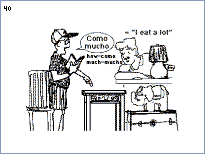 |
This is my favorite bilingual joke.
An American goes to South America and tries to learn the language by
total immersion. He gets a small apartment then goes out to find furniture
for it.
Here he has found a small table appropriate for his needs, so he gets
out his dictionary to ask the vendor "How much?"
He looks up "how" and the dictionary tells him "como"; "much" is "mucho".
So he points to the table and proudly says "Como mucho."
A few of you know enough Spanish to realize that he said "I eat a lot."
If you want to ask how much something costs in Spanish, you say "Quanto
cuesta."
The shopkeeper thought that if this guy eats a lot, maybe he would prefer
a larger table.
The point is, you can't just substitute words. |
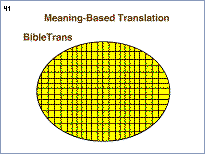 |
BibleTrans, the software I developed, does not do word substitution.
Instead, we break up the meaning of the Bible into small precise concepts,
like this grid here.
This is generally more precise than most languages. |
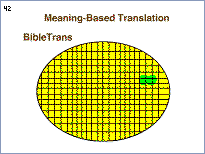 |
Remember that vague idea I had about slippery ice?
If it were an important Bible term, it might cover several BibleTrans
ideas, the way it did for Yupik.
Somebody must choose one of those ideas, ... |
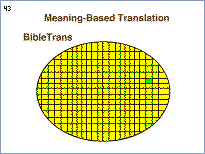 |
... whatever is appropriate for the context.
Machines are lousy at making these choices.
People do this all the time when we speak.
We pick the word that expresses the exact idea we have in mind.
Or maybe we fail to do so, and people misunderstand us.
Anyway, the point is, we -- people, not a computer --
must make decisions about which BibleTrans idea best represents each
idea the Author of the Biblical text had in mind.
Now, when we want to translate this idea into Yupik... |
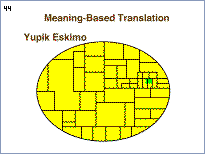 |
There is a pretty good fit. Not perfect, but reasonable.
A computer could almost make that decision, if it understood ideas.
But computers don't understand anything.
They only do what they are told to do -- even if you didn't want to
tell it to do that.
So we have real people make those decisions too. These people are called
linguists. They learn a language like Yupik, and then decide which word
in that language best fits the Biblical idea they are trying to translate.
There are a thousand or so of these people around the world, each one
working in some language with no Bible.
And 2000 more languages with nobody at all.
Anyway, the linguist decides which Yupik word best fits this concept... |
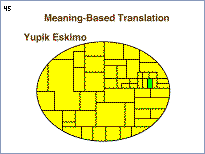 |
Then when BibleTrans comes to that idea, it can make the
translation accurately.
This is the general idea behind BibleTrans.
Now let's see how it works with real Bible ideas. |
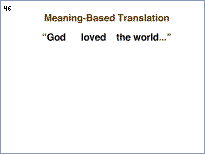 |
Here's part of a familiar verse. |
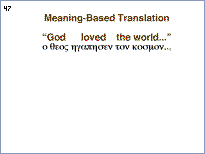 |
It was originally written in Greek, so I'm afraid you'll
have to suffer through a short Greek lesson. |
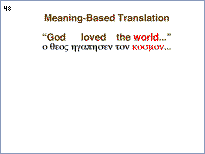 |
We will focus on one Greek word, cosmos, which is
translated into English as "world". |
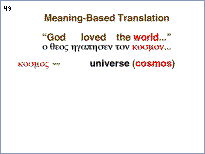 |
There are acually several meanings in the Bible for this
one Greek word,
depending on the context and who used it and so on.
I guess the primary meaning in classic Greek for the word cosmos
is ...
cosmos.
That's right, you knew that Greek word all along.
It means the universe, all there is or was or ever will be -- except
of course for God.
Greek isn't so hard, is it? |
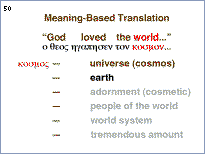 |
Another meaning of the Greek word cosmos as used
in the Bible is
the planet earth, the ground we walk on and everything in it.
That's why the King James translators used the word "world" for it. |
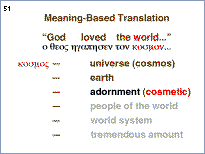 |
There's a completely different idea rooted in the same Greek
word.
You all know about cosmetics? Same Greek word, totally different meaning,
like that green snake.
Now, in John 3:16, is it saying that God loved His entire created universe?
Maybe...,
But that's not how we usually understand it.
We don't read that verse to mean that God loved the physical earth,
either.
And especially not that God loved putting on make-up. |
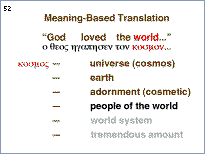 |
No, John 3:16 is about God loving all the people of the
world.
There are other senses for this same Greek word, used in different parts
of the New Testament.
The translators of the English Bible -- when they are doing a good job
--
they use different English words to accurately translate the different
senses of the Greek.
That's what translation is all about, and computers can't do it. Not
even my software.
What we can do, however, is make these decisions for the computer... |
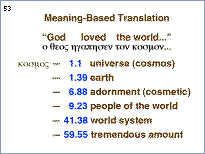 |
...by assigning distinct numbers to each different meaning,
each separate idea in the Greek text.
Computers work well with numbers. |
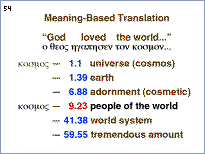 |
So we encode cosmos in John 3:16 as domain 9, concept
23 "people of the world."
God loved the people of the world.
Every language has some idea, some way to say "people of the world."
Maybe they need to use several words, like I did here in English,
but they can say it and everybody who speaks and understands that language
knows exactly what you mean.
Pretty much, anyway. |
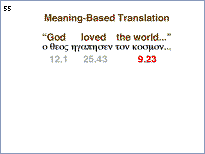 |
So now we encode the Greek word cosmos in John 3:16
as concept 9.23 |
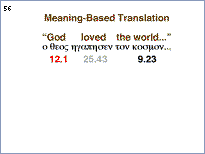 |
God -- Greek word theos -- could refer to any of
the gods or goddesses of Greek mythology,
but most often in the Bible, and specifically here in John 3:16, it
refers to the one Creator God,
who created the universe and everything in it.
That's concept number 12.1 |
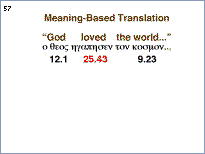 |
Similarly, the Greek verb agapein has a few variant
senses,
but we choose its primary sense of love, concept 25.43
Where did these numbers come from?
I didn't make them up.
They were defined by linguists Johannes Louw and Eugene Nida... |
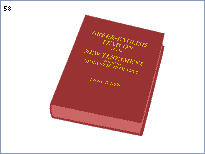 |
...in their book, Greek-English Lexicon of the New Testament
Based on Semantic Domains. |
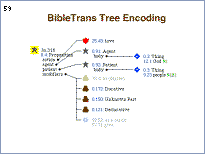 |
All this is very structured, which in the computer is numbers
and links.
The software lets you edit the details in the database by dragging and
dropping concepts, so it goes pretty quickly.
The hard part, the part the computer cannot do at all (or at best very
badly),
is deciding which numerical concepts to use to encode each idea in the
Greek text.
I paid a grad student to encode the whole book of Philippians. It took
her most of a year to do it. $8000.
It still needs work. There are mistakes that need correcting. I don't
have the budget for that.
She was an expert in Greek exegesis and translation; I'm not. |
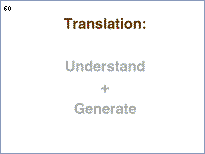 |
Translation happens in two steps. |
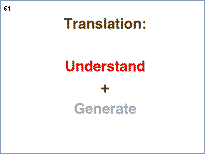 |
We have been looking at the understanding part of
the process.
It's very difficult, and computers just don't do it well at all.
BibleTrans works because people do the understanding and encoding
part.
Very skilled, highly trained people.
But once that is done,
we can make a thousand new Bible translations in a thousand new languages
in just a year or two. |
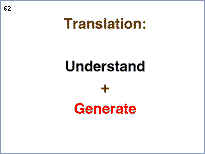 |
That's the second part of translation, generating the output
sentences in the new language.
This is the part that BibleTrans does well.
It still requires a linguist to learn the language and decide how to
say each Louw&Nida concept in that language,
but all the tedious work of actually translating the whole Bible verse
by verse can be done by computer. |
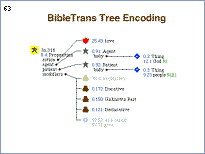 |
We start with that encoded semantic representation of the
Bible,
the actual meaning of the Greek text.
Then the linguist creates a rule for every different blue number in
the representation,
some 7000 concepts, how to say that idea in his language.
But we hide all the ugly machinery under a nice painted hood... |
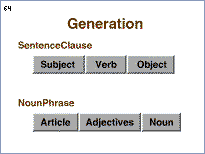 |
The linguist gets to think like a linguist,
and arrange the parts of a sentence in the order that the language requires
them.
In English, for example, a sentence has a basic Subject-Verb-Object
order,
with exceptions for questions and stuff like that.
Similarly, a noun phrase has an article, then whatever adjectives are
needed, followed by the noun. |
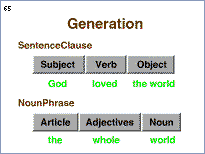 |
When you plug in specific words for these items you get
correct phrases and sentences.
Here God is the subject, "loved" is the verb, and "the world" is the
direct object.
Which [direct object] is broken down further into a noun phrase consisting
of an article "the",
followed by an optional adjective,
then the root noun, in this case "world".
Other languages have a different word order. |
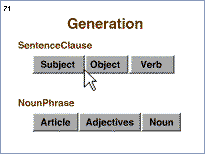 |
...and push it to the left... |
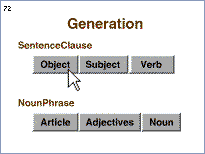 |
...where it belongs for Awa. |
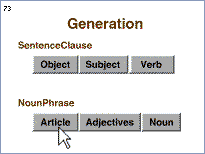 |
There are no articles in Awa, so we can grab this tile... |
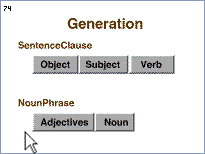 |
...and drag it right off the line.
That does word order.
Most languages have inflections... |
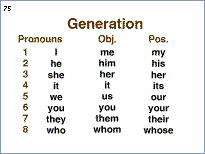 |
English doesn't inflect much, but we do inflect pronouns
by gender, number, and case.
Many languages -- like Spanish -- highly inflect their verbs, so you
don't even need pronouns,
because the information is right there in the verb ending.
BibleTrans uses tables to encode information like pronoun and verb inflections.
This table is for modern English pronouns. |
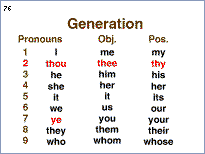 |
The King James Bible made a distinction between singular
and plural in 2nd person pronouns.
"Thee" and "thou" are not special holy words for speaking to God, they
are just singular.
Plural is "ye" and "you".
To do that in BibleTrans, you just add another line to the table,
and then tell it which pronoun to use when the person is referring to
himself or to the person he is speaking to. |
 |
The software really works.
You can go to my website and download it onto your computer and run
it in your own home.
I did that upstairs, and if everything works right, you can see it running
here. This is a little tricky because of the projection system, but we'll
try...
What you see here is the computer upstairs actually translating John
3:16 into English.
You won't get flowery King James English out of this, but the meaning
is quite accurate.
I tell people it comes out a little like the instructions you get with
a Korean appliance. |
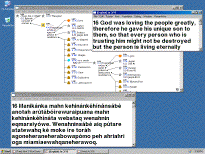 |
Then you have native speakers -- they don't need to be trained
linguists or Bible exegetes, just fluent in their own language -- clean
up the clumsiness.
For my next demo, I will translate the same verse into the Papua New
Guinea language Awa. You can see it applying special rules to get the tone
marks right. Awa is a tone language. I think "mother-in-law" and "pig"
are the same spelling, just different tones. I sat down with Ed and Aretta
Loving, the linguists who did the Awa New Testament, and asked them how
to arrange their sentences, and how to say each idea, then I put the rules
into the computer. Awa is a very difficult language, but Aretta tells me
this is a pretty good translation. Not exactly the way they did it, but
close.
Back to the slides... |
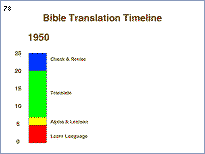 |
Some 70 or 80 years ago William Cameron Townsend started
the modern Bible translation movement and Wycliffe Bible Translators.
Translating the New Testament into a previously unwritten language took
maybe 25 years -- some more, some less, depending on a lot of factors.
First you had to learn the language. That's red in this chart.
Then you needed to devise a suitable alphabet and build a dictionary
for it. That's yellow.
Then you have 7942 verses of the New Testament to translate by hand,
here shown in green.
Finally you need to test it out with native speakers to be sure they
understand it correctly, and fix the mistakes.
At the end of 25 years, the poor translator is exhausted. So he retires
and goes home. |
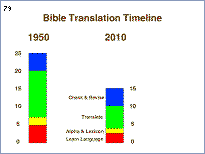 |
Today the process goes a little faster.
The linguists are better trained in linguistics, so they can learn
the language more quickly.
We have exegetical aids to facilitate the translation.
These folks are trained by Wycliffe, so they can do it much faster,
perhaps in half the time.
They work harder at checking the translation, so that still takes a
long time.
At the end of his 15 years, the guy is exhausted. But he's too young
to retire. Maybe he will do the Old Testament,
or more likely he sort of retires and works in the home office until
he's old enough to retire for real. |
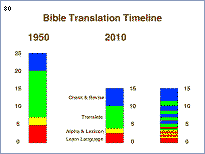 |
Now of course these translations don't happen in nice blocks
of time like that.
In reality, the guy learns language for a while, and writes some dictionary
as he goes, alternately learning and writing.
Pretty soon he thinks he can try a verse or two -- and discovers how
much he doesn't know.
Then he does the gospel of Mark, followed by a short epistle, checking
each one as he goes,
so his young church has something to read while he's working on the
rest. |
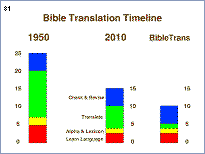 |
BibleTrans does not help with the language learning, nor
the dictionary work. Those are the same.
But it takes a big chunk out of the translation part. You still need
to check the result -- perhaps even more carefully.
But the local church leaders can be trained to check the readability
of the translation.
After five or eight years, the professional linguist can move on to
another language.
He could see three New Testaments to completion in the time it took
Cameron Townsend to do one.
If he works with national church leaders, he could do ten or twenty
translations.
He does the part that needs a trained linguist, and they do the part
that needs fluent speakers. |
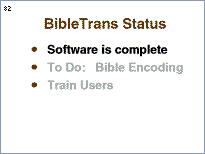 |
[Pause]
Where are we?
The BibleTrans software works today. It could be improved, but it works. |
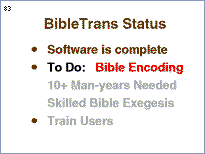 |
The hard part is encoding the Bible into the unambiguous
numbers representing the exact meaning of the Bible text. |
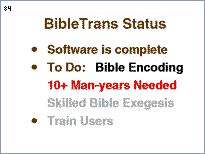 |
To do the job right will take ten or more man-years. |
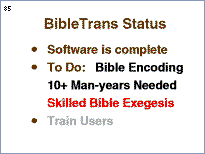 |
Not just anybody,
this part needs to be done by people who understand Bible exegesis,
getting the meaning exactly right.
It takes a lot of concentration.
We need to get it right if a thousand Bible translations are going to
depend on it. |
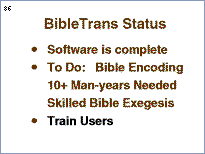 |
Finally, once the database is ready, we need to train linguists
in how to use it. |
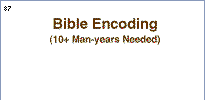 |
Let me say some more about that Bible encoding job. |
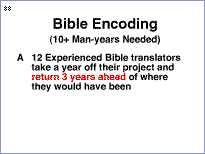 |
If a dozen experienced Bible translators took a year off
their translation project
to encode a full gospel or a few smaller epistles,
they could go back to their translation project three years ahead of
where they would have been if they'd just stayed there working on it.
But how do they explain this to their supporting churches? |
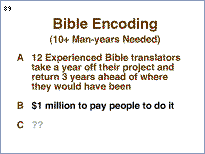 |
Alternatively, if somebody with deep pockets got a vision
for Bible translation,
we could hire qualified people to do the job right.
I don't have that kind of money.
I personally don't know anybody who does.
God gave me very good computer skills.
He did not give me the administrative ability to assemble and motivate
a team committed to making computer-assisted Bible translation happen.
He must have other people in mind for that part of the task, and I don't
know who they are. |
 |
That's what I've been doing with Bible translation since
1995.
You can go to my website and find more information. |
Questions & Comments
Q. What's the next step?
A. I'm stuck. I need other people involved, and I don't know
how to make it happen.
Q. What about Bible translation organizations, such as New Tribes
and Wycliffe?
A. Wycliffe is the largest. They are the world's experts in linguistics
in general, and Bible translation in particular. They know good
machine translation can't be done. And they are right! But BibleTrans doesn't
do it that way.
A handful of Wycliffe people have seen BibleTrans working and say
they believe it could do the job: Alan Buseman, Aretta Loving, the Hohoulins,
Elizabeth Miles. Getting through to the decision-makers is something else.
New Tribes Mission teaches their translators to start with Genesis.
We have a lot more work before BibleTrans is ready to do the Old
Testament.

































































